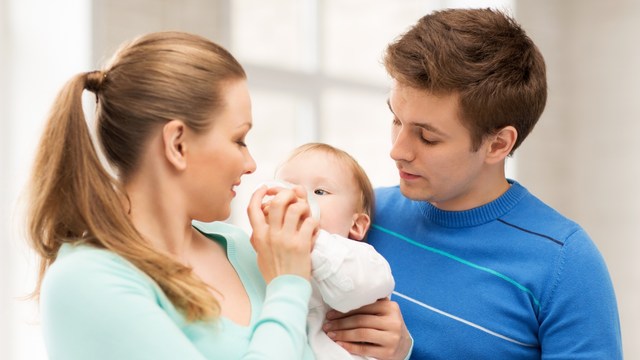 Lev Dolgachov/PhotoSpin
Lev Dolgachov/PhotoSpin
What is Diarrhea and What Causes it?
Diarrhea is not uncommon in childhood and is not always something for parents to panic about. Diarrhea (loose, watery, and runny stool) is actually the body’s way of getting rid of germs. Most episodes last a few days to a week, and can occur with fever, nausea, vomiting and abdominal cramping. (1)
Diarrhea is commonly caused by an infection from a parasite, bacteria (e.g., salmonella) or virus (rotavirus). (1)
Use of certain medications, food poisoning, irritable bowel disease, Crohn’s disease and celiac disease are accompanied by diarrhea. Gluten or lactose sensitivity, dairy allergy, and other food allergies or sensitivities may also cause diarrhea.
In very young children, consumption of too much juice or other sugary drinks can also lead to “toddler’s diarrhea.”
Dehydration: a Complication of Diarrhea
The most common side effect of diarrhea is dehydration. “Mild diarrhea usually doesn’t cause significant fluid loss, but moderate or severe diarrhea can.” (1)
The FDA warns that if the bout of diarrhea lasts longer than 24 hours, young children are at risk of dehydration.
This can occur as the diarrhea flushes out essential fluids containing salts, potassium, electrolytes and other minerals the body needs to function. Severe dehydration can result in seizures, coma, organ failure and, rarely, death.
Signs of dehydration include:
• Dizziness, lightheadedness
• Dry, sticky mouth, lips and tongue
• Dark yellow urine, or very little or no urine for 3 hours or more
• Few or no tears when crying
• Cool, dry skin, lacking elasticity
• Lack of energy
• Racing heartbeat
• Sunken eyes can occur later
Prevention and Treatment of Diarrhea and Dehydration in Young Children
Benjamin Ortiz, M.D., a pediatrician in the Food and Drug Administration’s Office of Pediatric Therapeutics says that mild diarrhea is a discomfort, but not dangerous if the child continues to drink and eat a regular diet.
If it persists or occurs frequently, then parents should consider a change in diet, and oral rehydration solutions (ORS) or electrolyte solutions. These will provide the right amount sugar to help the body absorb the needed nutrients and electrolytes.
Too much sugar such as that found in fruit juice, colas and sports drinks can actually make the diarrhea worse. Anti-diarrheal medications should also be avoided with young children. (2)
Parents should be focused on recognizing signs of dehydration and taking steps to keep their child hydrated or get them rehydrated.
Dr. Ortiz recommends that parents “try to encourage the child to drink as much of an oral rehydration solution or a regular diet as possible, even a few ounces every 15 to 30 minutes ...” and avoid using boiled milk or rice water or other home remedies. (2)
Contact your doctor if:
• Diarrhea worsens or lasts longer than 24 hours
• You observe blood or pus in the stool (black and tarry)
• The child is running a high fever (102 or higher)
• You observe signs of dehydration in your child
• Your child is persistently vomiting and can’t hold anything down
Take your child to the hospital if:
• Your child shows signs of severe dehydration
• Your child is persistently vomiting and can’t hold anything down
• Your child is more than 6 months old with a fever over 105° F rectally
If you observe bright red blood that sits on top of the stool, that is usually a sign that the tissues around the rectum are irritated, and is not a sign that something is wrong internally. However, check with your pediatrician to ask if you should use a cream to soothe the area.
“A quick bout of diarrhea doesn’t have to become a dangerous digestive health concern – just give your child plenty of water and some mild foods until he’s feeling better again. But watch for worsening symptoms or signs of dehydration and always call your pediatrician if you need that extra reassurance.” (2)
Sources:
1. Diarrhea in Children: Causes and Treatments. WebMD. Web. Accessed: Apr 17, 2014.
http://www.webmd.com/children/guide/diarrhea-treatment
2. Don’t Ignore Diarrhea in Children. Rodriguez, Diana. Everyday Health. Web. Accessed: Apr 17, 2014.
http://www.everydayhealth.com/digestive-health/diarrhea-and-children.aspx
3. Straight Poop on Kids and Diarrhea. Federal Drug Administration. Web. Accessed: Apr 17, 2014.
http://www.fda.gov/forconsumers/consumerupdates/ucm277359.htm
Reviewed April 18, 2014
by Michele Blacksberg RN
Edited by Jody Smith






Add a CommentComments
There are no comments yet. Be the first one and get the conversation started!